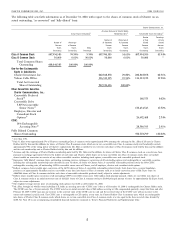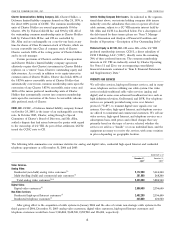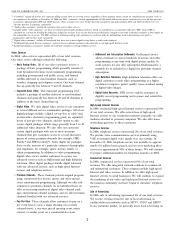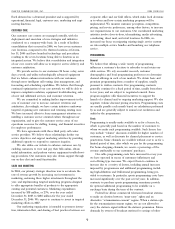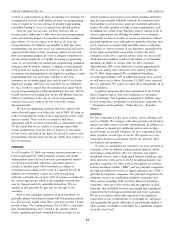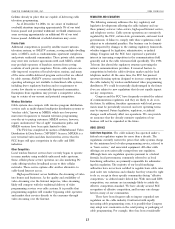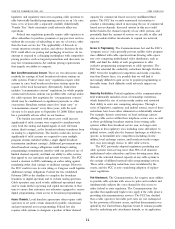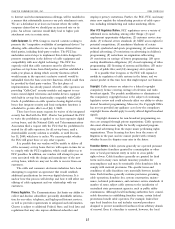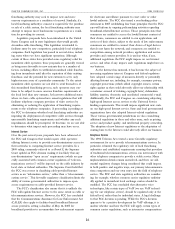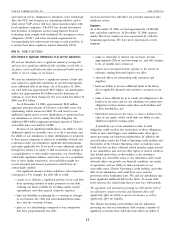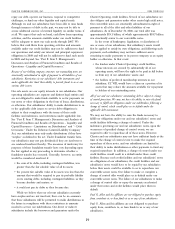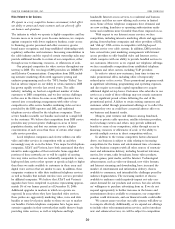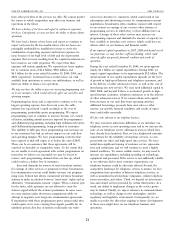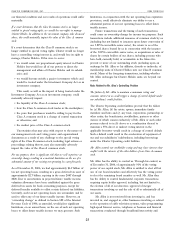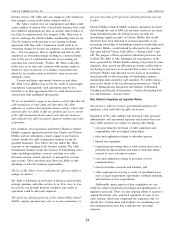Charter 2006 Annual Report Download - page 29
Download and view the complete annual report
Please find page 29 of the 2006 Charter annual report below. You can navigate through the pages in the report by either clicking on the pages listed below, or by using the keyword search tool below to find specific information within the annual report.
CHARTER COMMUNICATIONS, INC. 2006 FORM 10-K
to Internet and telecommunications offerings, will be modified in employee privacy restrictions. Further, the FCC, FTC, and many
a manner that substantially increases our pole attachment costs. states now regulate the telemarketing practices of cable opera-
We are a defendant in at least one lawsuit where the utility tors, including telemarketing and online marketing efforts.
company claims that we should pay an increased rate on its
Other FCC Regulatory Matters. FCC regulations cover a variety of
poles. An adverse outcome would likely lead to higher pole
additional areas, including, among other things: (1) equal
attachment costs in certain states.
employment opportunity obligations; (2) customer service stan-
Cable Equipment. In 1996, Congress enacted a statute seeking to dards; (3) technical service standards; (4) MDU access rights for
promote the ‘‘competitive availability of navigational devices’’ by potential competitions; (5) mandatory blackouts of certain
allowing cable subscribers to use set-top boxes obtained from network, syndicated and sports programming; (6) restrictions on
third parties, including third-party retailers. The FCC has political advertising; (7) restrictions on advertising in children’s
undertaken several steps to implement this statute designed to programming; (8) restrictions on origination cablecasting;
promote competition in the delivery of cable equipment and (9) restrictions on carriage of lottery programming; (10) spon-
compatibility with new digital technology. The FCC has sorship identification obligations; (11) closed captioning of video
expressly ruled that cable customers must be allowed to programming; (12) licensing of systems and facilities; (13) main-
purchase set-top boxes from third parties, and has established a tenance of public files; and (14) emergency alert systems.
multi-year phase-in during which security functions (which It is possible that Congress or the FCC will expand or
would remain in the operator’s exclusive control) would be modify its regulation of cable systems in the future, and we
unbundled from the basic converter functions, which could then cannot predict at this time how that might impact our business.
be provided by third party vendors. The first phase of
Copyright. Cable systems are subject to a federal copyright
implementation has already passed, whereby cable operators are
compulsory license covering carriage of television and radio
providing ‘‘CableCard’’ security modules and support to cus-
broadcast signals. The possible modification or elimination of
tomer-owned digital televisions and similar devices equipped
this compulsory copyright license is the subject of continuing
with built-in set-top box functionality compatible with Cable-
legislative review and could adversely affect our ability to obtain
Cards. A prohibition on cable operators leasing digital set-top
desired broadcast programming. Moreover, the Copyright Office
boxes that integrate security and basic navigation functions is
has not yet provided any guidance as to how the compulsory
scheduled to go into effect as of July 1, 2007.
copyright license should apply to newly offered digital broadcast
There have been many requests for waiver of the integrated
signals.
security ban filed with the FCC. Charter has petitioned the FCC
Copyright clearances for non-broadcast programming ser-
to waive the prohibition as applied to our least expensive digital
vices are arranged through private negotiations. Cable operators
set-top boxes, and the National Cable and Telecommunications
also must obtain music rights for locally originated program-
Association filed a request with the FCC that the prohibition be
ming and advertising from the major music performing rights
waived for all cable operators, for all set-top boxes, until a
organizations. These licensing fees have been the source of
downloadable security solution is available, or until Decem-
litigation in the past, and we cannot predict with certainty
ber 31, 2009, whichever is earlier. We cannot predict whether
whether license fee disputes may arise in the future.
the FCC will grant these or any other requests.
It is possible that our vendors will be unable to deliver all Franchise Matters. Cable systems generally are operated pursuant
of the necessary set-top boxes that we will require in time for us to nonexclusive franchises granted by a municipality or other
to comply with the FCC regulation, which could subject us to state or local government entity in order to cross public
FCC penalties. In addition, our vendors will attempt to pass on rights-of-way. Cable franchises generally are granted for fixed
costs associated with the design and manufacture of the new terms and in many cases include monetary penalties for
set-top boxes, which we may not be able to recover from our noncompliance and may be terminable if the franchisee fails to
customers. comply with material provisions. The specific terms and
The cable and consumer electronics industries have been conditions of cable franchises vary materially between jurisdic-
attempting to negotiate an agreement that would establish tions. Each franchise generally contains provisions governing
additional specifications for two-way digital televisions. It is cable operations, franchise fees, system construction, mainte-
unclear how this process will develop and how it will affect our nance, technical performance, and customer service standards. A
offering of cable equipment and our relationship with our number of states subject cable systems to the jurisdiction of
customers. centralized state government agencies, such as public utility
commissions. Although local franchising authorities have consid-
Privacy Regulation. The Communications Act limits our ability to
erable discretion in establishing franchise terms, certain federal
collect and disclose subscribers’ personally identifiable informa-
protections benefit cable operators. For example, federal law
tion for our video, telephone, and high-speed Internet services,
caps local franchise fees and includes renewal procedures
as well as provides requirements to safeguard such information.
designed to protect incumbent franchisees from arbitrary denials
Charter is subject to additional Federal, State, and local laws and
of renewal. Even if a franchise is renewed, however, the local
regulations that may also impose additional subscriber and
15


